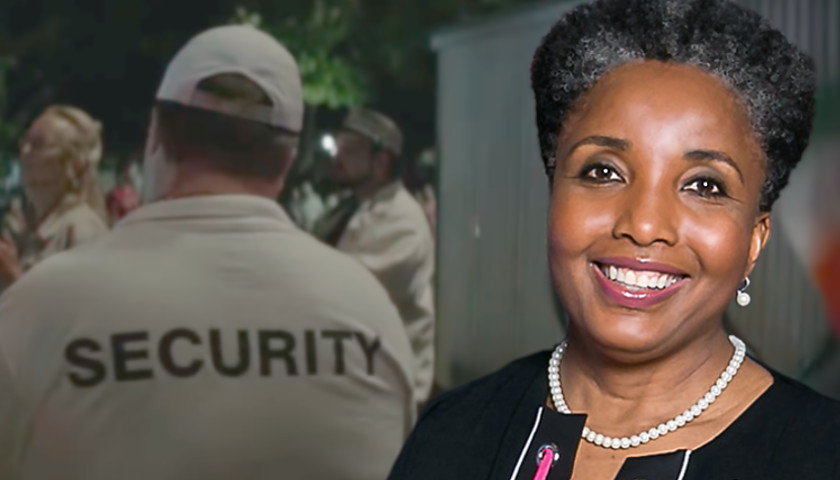by Carol M. Swain
I left the theater saddened after watching Clint Eastwood’s latest directorial work, “Richard Jewell,” a film about the falsely accused Atlanta Olympic Park bomber and the media’s rush to judgment.
I was disheartened because Jewell, now deceased, represents every American and especially the Trump “deplorables.” Any one of us can be falsely accused of a crime, and our ability to defend ourselves often depends on resources and knowledge many of us lack.
We live in a society where trials-by-media are commonplace, and due process and the presumption of innocence are fading away, part of a bygone era. In the U.S. judicial system, due process is supposed to mean that every citizen is accorded legal rights and protection from governmental overreach.
We find protection in the Fifth Amendment to the U.S. Constitution, which states, “No person shall … be deprived of life, liberty, or property, without due process of law,” and it applies to the states via the 14th Amendment.
Due process is accompanied by the presumption of innocence unless proven guilty in a court of law. So much for that; witness the recent cases marked by a total breakdown in due process and the presumption of innocence for both Supreme Court Justice Brett Kavanaugh and Judge Roy Moore in their media trials. They represent current examples of a trend that started more than two decades ago.
In the Jewell story we see a flawed and man-eating media, as well as an FBI that apparently either forgot or ignored its own mission statement to protect the American people and uphold the U.S. Constitution.
Here we are today, more than 20 years after the Atlanta Park Bombing, and once again the FBI—or at least elements and former elements of the FBI—has been brought into question concerning not only the current impeachment proceedings but also that the FBI might have spied on President Donald Trump’s 2016 campaign. For real. Protect whom; uphold what?
The Atlanta Park Bombing
At the time of the 1996 Summer Olympics held in and around Atlanta, Richard Jewell was a blue-collar security guard for AT&T and a law-enforcement enthusiast. He then entered the annals of American history when he stumbled upon a backpack loaded with three pipe bombs that was left abandoned in Centennial Olympic Park.
Seeing the backpack as suspicious, Jewell alerted Georgia law enforcement and then worked fervently with them to warn nearby people to abandon the area before the bomb exploded, killing two people and injuring more than 100 more. It could have been much worse, as the park was teeming with people.
After spending two days as a hero who potentially saved hundreds of lives, Jewell saw his life quickly flipped. False tips from a previous employer of Jewell’s made him the unwitting subject of an FBI investigation and the victim of a destructive media frenzy that lasted 88 days before the FBI cleared his name. However, there was no undoing the profound damage that had been done to Jewell and his mother Bobi, with whom he lived.
Jewell’s salvation came in the form of attorney Watson Bryant, who was familiar with and sympathetic to easily victimized underdogs, such as Jewell. Without Bryant intervening on Jewell’s behalf, it’s a given that the FBI would have eventually arrested and railroaded a naive man who had trusted the American system of justice.
Jewell fit the stereotype of a demographic Hillary Clinton once described as deplorables. He was obese, lived at home with his mother, liked guns and hunting, and was a Southern Baptist. He was also a white, heterosexual southern man concerned about being falsely labeled as a homosexual. In other words, he’s like catnip to an extreme liberal like Clinton and others of her ilk.
Jewell’s victimization and trial-by-media began three days after the bombing, when the Atlanta Journal-Constitution published an exclusive story identifying him as a suspect. One of the more memorable lines from the film is uttered by Bryant’s assistant Nadya Light, a Russian emigre suspicious of the media reports. She tells Bryant that where she comes from, “When the government says a man is guilty, I know he is innocent.” In other words, he didn’t do it.
As we now have long since known, it turned out that Jewell was indeed innocent and never actually charged by the FBI. He died of heart disease in 2007 at the relatively young age of 44. Eric Rudolph, the real Atlanta bomber, was arrested seven years after the 1996 bombing and ultimately confessed to his role in the bombing as well as several others that occurred during the mid-1990s. During the summer of 2005, he made a plea agreement with the U.S. Department of Justice in which he was sentenced to four life sentences.
Back to the FBI
We now know from the Department of Justice that the FBI engaged in deception by trying to get Jewell to waive his constitutional rights by telling him that he had been selected to help them make a training video about bomb detection. In doing so, they took advantage of Jewell’s trust in law enforcement and his eagerness to help them solve the case.
But Jewell was no FBI patsy. He had enough old-fashioned common sense and law enforcement knowledge to realize he needed a lawyer. Bryant was the only lawyer he knew, and he had worked in a firm that employed Jewell as a supply clerk some 10 years earlier. Bryant took on the role of protector of Jewell’s civil rights.
In recent years, we have watched the erosion of our civil liberties and the complicity between political parties, the media, and governmental institutions such as the Internal Revenue Service and the FBI. In a decade that has given us a partisan former FBI director in James Comey, FISA warrants and judges, and questionable actions involving our attorneys general, a degree of skepticism by the people is always warranted.
The Film’s Characterization of Media
Feminists and her friends and family are upset because the film portrays Journal-Constitution reporter Kathy Scruggs as a self-promoting, morally questionable woman who traded sex for the FBI tip that named Jewell as the lead suspect. Eastwood and Warner Brothers are accused of making up a story that sullies Scruggs’ reputation because, or so we are told, we know that women do not trade sex for job advancement, at least not in the 21st century. We know the media is above reproach, and they always report the facts without spin and interpretation (eye roll).
Scruggs died of a drug overdose in 2001 at age 42. In a Variety article, her former editor described her as “aggressive and colorful but professional and serious about her work.” After defending her against the sex-for-tips implication, her brother said, “She had big hair, wore short skirts, smoked cigarettes, and cussed like a sailor. She was no saint but she always told the truth.”
The fallout from Scruggs being the catalyst for the publication of the initial story is said to have taken an enormous toll on her. One could argue she became a victim of her own ambition, regardless of what she did or didn’t do in getting her scoops.
The Journal-Constitution is suing Warner Brothers and Clint Eastwood for their portrayal of Scruggs and their newspaper’s rush-to-judgment. This controversy detracts from the irresponsible behavior of the media and its feeding frenzy as well as the unscrupulous and morally questionable actions of the FBI.
Although Jewell and his mother Bobi got to see him exonerated and given remuneration for some of their suffering, we know deep down false accusations take their toll and lives injured can never be fully restored.
– – –
Carol M. Swain is a former tenured professor at Vanderbilt and Princeton universities. Her Be The People News blog and podcast empower individuals to think independently, understand their responsibility, and make a difference in the world. An earlier version of this article was published in The Epoch Times.
Photo “Richard Jewell” by Movieclips Trailers.








Excellent! Thanks, Carol Swain. Your commentary reminds me of a quote, in a dissenting opinion, by a true classical liberal SCOTUS Justice, who upheld the liberties of the People as protected by the wording of ALL of the Bill of Rights:
“Decency, security, and liberty alike demand that Government officials shall be subjected to the same rules of conduct that are commands to the Citizen. In a Government of laws, existence of the Government will be imperiled if it fails to observe the law scrupulously. Our Government is the potent, the omnipresent teacher. For good or for ill, it teaches the whole people by its example. Crime is contagious. If the Government becomes a law-breaker, it breeds contempt for law; it invites every man to become a law unto himself. It invites anarchy. To declare that, in the administration of the law, the end justifies the means would bring a terrible retribution. Against that pernicious doctrine, this Court should resolutely set its face.”, Justice Louis D. Brandeis, Olmstead vs. U.S. , 1928